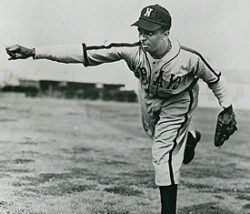Johnny Wright
New Orleans native Johnny Wright was one of the first African American baseball players to sign with the Brooklyn Dodgers, but he never reached the major leagues.

Courtesy of Wikimedia Commons
Johnny Wright. Unknown
New Orleans native John Richard “Johnny” Wright experienced a brush with greatness that is both breathtaking and heartbreaking. Signed to the Montreal Royals, a minor-league affiliate of the Brooklyn Dodgers, in 1946, just weeks after the legendary Jackie Robinson joined the same team, Wright had a shot at being the first, or at the very least the second, African American player to break Major League Baseball’s unwritten “gentlemen’s agreement” that had barred black players from organized baseball since 1889.
But unlike the confident, steadfast Robinson, Wright, a pitcher, displayed a purported discomfort and nervousness that doomed him to failure in the minor leagues and kept him from achieving the heights of mainstream stardom that the trailblazing Robinson enjoyed.
Born on November 28, 1916, in New Orleans, Wright graduated from the city’s segregated McDonogh 35 High School. Wright reportedly played for African American semi-pro teams, including the New Orleans Zulus, who were as much sports entertainment as a professional team, in the same vein as basketball’s Harlem Globetrotters. In 1937, at age twenty, he was signed by the big-time Newark Eagles of the Negro National League. He went on to excel on the mound with the Atlanta Black Crackers (1938), the Pittsburgh Crawfords (1938), the Toledo/Indianapolis Crawfords (1939–1940), and twice with the Homestead Grays (1941–1943, 1945), in a community adjacent to Pittsburgh. His time with the Grays was interrupted by World War II service in the Navy. As an enlisted sailor he pitched for the Great Lakes Naval Station team, a black club.
Wright’s performance with the Grays attracted the attention of Brooklyn Dodgers executive Branch Rickey, who was endeavoring to integrate the majors with a black player in the mid-1940s, though, he said, “We didn’t sign either of these boys [Robinson and Wright] because of political pressure,” according to a March 1946 edition of The Sporting News. “We signed ’em because of our desire to have a winning team in Brooklyn. I would have signed an elephant as quickly if the elephant could have played center field.”
Overall, Wright hurled three no-hitters and dominated batters in the Negro Leagues before getting his shot with an all-white team. Pioneering African American sportswriter Sam Lacy wrote at the time: “Wright doesn’t boast the college background that is Jackie’s, but he possesses something equally valuable—a level head and the knack of seeing things objectively. He is a realist in a role which demands divorce from sentimentality.” (Robinson attended the University of California, Los Angeles from 1939 to 1941 and became the only athlete in UCLA history to letter in four sports.)
The Dodgers inked Wright to a deal, but modern opinion is split over why exactly the New Orleanian was given a contract. Some historians and black baseball experts assert that Rickey viewed Wright as a legitimate major-league prospect who had a strong chance of making it to that level. Other pundits, however, believe Wright was brought on board by Brooklyn solely to serve as a confidante and companion to Robinson, whom these theorists say was the player identified by Rickey as the groundbreaker all along.
Regardless of why Wright was signed by Brooklyn, he foundered in the Dodgers’ minor-league farm system for a season in 1946 before returning to the Grays and the Negro Leagues a year later, at the same time that Robinson was making his historic debut in the majors. Many contemporaries attributed Wright’s failure to an overwhelming discomfort and anxiety with competing alongside white players and working for white managers and executives—along with enduring jeers and expletives hurled at both him and Robinson from racist spectators. It was rumored that, in 1946, a lynch mob appeared during spring training in Sanford, Florida, and neither Robinson nor Wright could lodge with their fellow players at a segregated hotel.
After his hardball career ended in 1948, Wright returned to obscurity, retiring as a porter before dying in 1990 in Mississippi and leaving open the ongoing debate about his role in the integration of baseball. “Johnny Wright had the ability to play in the major leagues, but that was only one part of it,” Hall of Fame Negro Leaguer Walter “Buck” Leonard wrote in his autobiography. “There was something else, too. Robinson stood up under the pressure and Wright didn’t. He just wasn’t able to stand the pressure and couldn’t take the things he had to take. I don’t think many people could have or would have.”
